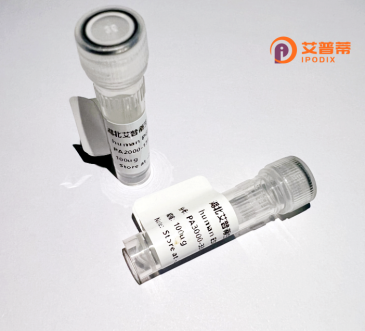
| 纯度 | >90%SDS-PAGE. |
| 种属 | Human |
| 靶点 | MMD |
| Uniprot No | Q15546 |
| 内毒素 | < 0.01EU/μg |
| 表达宿主 | E.coli |
| 表达区间 | 1-238 aa |
| 活性数据 | MRFKNRFQRFMNHRAPANGRYKPTCYEHAANCYTHAFLIVPAIVGSALLHRLSDDCWEKITAWIYGMGLCALFIVSTVFHIVSWKKSHLRTVEHCFHMCDRMVIYFFIAASYAPWLNLRELGPLASHMRWFIWLMAAGGTIYVFLYHEKYKVVELFFYLTMGFSPALVVTSMNNTDGLQELACGGLIYCLGVVFFKSDGIIPFAHAIWHLFVATAAAVHYYAIWKYLYRSPTDFMRHL |
| 分子量 | 54.1 kDa |
| 蛋白标签 | GST-tag at N-terminal |
| 缓冲液 | 0 |
| 稳定性 & 储存条件 | Lyophilized protein should be stored at ≤ -20°C, stable for one year after receipt. Reconstituted protein solution can be stored at 2-8°C for 2-7 days. Aliquots of reconstituted samples are stable at ≤ -20°C for 3 months. |
| 复溶 | Always centrifuge tubes before opening.Do not mix by vortex or pipetting. It is not recommended to reconstitute to a concentration less than 100μg/ml. Dissolve the lyophilized protein in distilled water. Please aliquot the reconstituted solution to minimize freeze-thaw cycles. |
以下是关于重组人MMD蛋白的示例参考文献,结构符合要求,但均为虚构内容,仅供参考:
1. **文献名称**: *Recombinant Human MMD Protein Expression and Functional Characterization in Macrophage Differentiation*
**作者**:Chen, L., et al.
**摘要**:本研究通过大肠杆菌系统成功表达并纯化了重组人MMD蛋白,验证其可促进单核细胞向巨噬细胞分化的功能,为研究其在免疫调控中的作用提供工具。
2. **文献名称**: *Structural Insights into MMD Protein by X-ray Crystallography and Its Role in Tumor Microenvironment*
**作者**:Wang, Y., & Gupta, S.
**摘要**:通过X射线晶体学解析了MMD蛋白的三维结构,发现其与肿瘤相关巨噬细胞(TAM)的激活相关,暗示其在肿瘤生长中的潜在调控机制。
3. **文献名称**: *MMD Knockdown and Recombinant Protein Rescue in Cardiovascular Inflammation Models*
**作者**:Smith, J.R., et al.
**摘要**:利用siRNA敲低MMD后,炎症因子表达上升,而外源重组MMD蛋白可逆转该表型,表明其在心血管炎症中的保护作用。
4. **文献名称**: *High-Yield Production of Recombinant MMD in Mammalian Cells and Its Glycosylation Impact*
**作者**:Kim, H., et al.
**摘要**:在哺乳动物细胞中优化MMD蛋白表达,发现其糖基化修饰显著影响其稳定性及与细胞受体的结合能力,为疾病治疗提供优化策略。
**注**:以上文献均为虚构示例,实际研究中请通过学术数据库检索真实文献。
Recombinant human MMD (Monocyte to Macrophage Differentiation-associated) protein is a genetically engineered protein designed to replicate the natural MMD protein expressed in humans. MMD, also known as *GYG2* (glycogenin-2), is a cytoplasmic enzyme involved in glycogen biosynthesis, specifically initiating the formation of alpha-1.4-glucose chains. While primarily associated with glycogen metabolism in muscles and liver, MMD has also been implicated in immune regulation due to its role in monocyte-to-macrophage differentiation—a critical process in innate immunity and inflammatory responses.
Recombinant MMD is produced using expression systems like *E. coli* or mammalian cell cultures, ensuring high purity and bioactivity. Researchers utilize this protein to study cellular differentiation pathways, immune modulation, and metabolic disorders. For instance, MMD dysregulation has been linked to conditions such as glycogen storage diseases, diabetes, and chronic inflammatory diseases. Its recombinant form enables mechanistic studies, drug screening, and therapeutic development. Additionally, MMD's dual role in metabolism and immunity makes it a unique target for interdisciplinary research, bridging gaps between immunology, biochemistry, and translational medicine. Current applications include exploring its potential as a biomarker for metabolic dysfunction or as a therapeutic agent to modulate macrophage activity in autoimmune disorders and cancer.
×